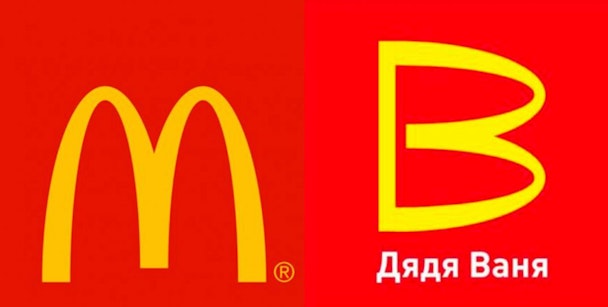As McDonald’s and Starbucks exit Russia entirely, what IP problems do remaining brands face?
McDonald’s and Starbucks faced problems in Russia after their logos and corporate identity were hijacked, despite pausing business. Now the companies have pulled out of the country altogether. Mark Caddle of intellectual property firm Withers & Rogers takes a look at the issues troubling the big brands still operating there.

Western brands operating in Russia are concerned that they might no longer have a right of recourse if their logo or other aspects of their corporate identity are used without their permission. Trade marks and other IP rights have effectively become a new weapon of war.
A court case last month put this into the spotlight. It was an infringement claim brought by UK-based Entertainment One against a Russian entrepreneur, over an alleged abuse of its trade mark rights for the popular cartoon characters Peppa Pig and Daddy Pig. The judge at the Kirov Arbitrazh court dismissed the claim in retaliation for economic sanctions imposed against Russia, referencing the fact that the rightsholder is from an ‘unfriendly state’. The ruling is concerning because it suggests that western companies with trade mark and other IP rights in Russia may no longer be able to enforce them.
For brand owners with commercial interests in Russia, it is important not to read too much into this particular court ruling. It is a one-off decision by a single court and trade mark legislation in Russia has not changed. However, it seems likely that a decree made by the Russian government on March 6 permitting patented technologies from ‘unfriendly countries’ to be used without permission or compensation, could have motivated the judge’s decision in the Peppa Pig case. That said, on March 11 the Court of St Petersburg decided in Entertainment One’s favor in another trade mark infringement case and so brand owners should watch out for which of the decisions is followed by other Russian courts in later cases.
If other Russian courts decide to follow the Kirov court’s example, it could set a concerning precedent. Importantly, however, this would effectively involve discriminating against rightsholders based on their nationality, which could contravene various international treaties that Russia is currently signed up to, including the Trade-Related Aspects of Intellectual Property Rights (Trips) agreement. It is not clear whether the Russian government would welcome such a go-it-alone strategy or view it as a step back to times when the country was less involved in global trade and IP theft was rife.
Since Russia’s invasion of Ukraine, many prominent western brands have either ceased trading or pulled out of the country altogether in support of economic sanctions. Among them are McDonald’s and Starbucks, which shuttered outlets across Russia, while Ikea has closed all of its stores and factories. Other brands, including Goldman Sachs, Coca-Cola, Pepsi, Proctor & Gamble, Microsoft, Porsche and Toyota, have pulled out of the country and Mastercard and Visa have suspended operations. Indeed, a number of western brands have already come under attack from opportunistic Russian businesses seeking to misappropriate their corporate identities for commercial gain.
The most obvious example is a trade mark application for a copy of the McDonald’s logo with the words ‘Uncle Vanya’s’ underneath, sparking fears of wider misuse. Russian trade mark applications for ‘Starducks’ and ‘Makdonalds’ also exist.
Should the Ukraine war become protracted, the commercial pain for western brand owners could be considerable and more examples of brand theft will come to light. A raft of counterfeit businesses could be established, representing a significant reputational threat to western brand owners in the future. When the war eventually concludes, trading relations with Russia could take time to re-establish. Some western brand owners may already be considering severing their ties with the Russian marketplace altogether.
To guide their decision making, western brand owners should seek strategic advice from IP professionals who are familiar with developing and maintaining international rights portfolios. For example, they need to weigh up the commercial implications of renewing any existing trade mark rights in Russia, or seeking new trade mark rights, and decide how far they are prepared to go in maintaining and securing these rights, despite the fact that they can’t currently be enforced. It is also advisable to monitor for any infringing activity and collect evidence, as this could be useful in the future, assuming normal trading conditions resume. It is also worth keeping an eye on countries accepting Russian imports as it may be possible to enforce IP rights in these territories.
For the time being, brand owners should continue to protect their Russian trade marks and other IP assets in the usual way in the hope that normal trading conditions will resume sooner rather than later. However, the longer the conflict continues, the more likely it is that some businesses will need to take decisions about whether to cut their losses and turn their back on the Russian marketplace for now.
Mark Caddle is partner and trade mark attorney at European intellectual property firm Withers & Rogers.
